Recap
In Part 1 of my review, I discussed this unofficial sequel script’s spurious providence and mysterious writer. I also started off with a critique of the cover page and page one.
To reiterate, these posts are meant to be educational for writers to see what goes on in the minds of script readers (or at least mine) while they’re plowing through your script. Most of the comments I post here are meant to convey what I’m thinking and wouldn’t necessarily be included in any official script notes that I provide.
So with that out of the way, let’s see where we stand at the end of page 1.
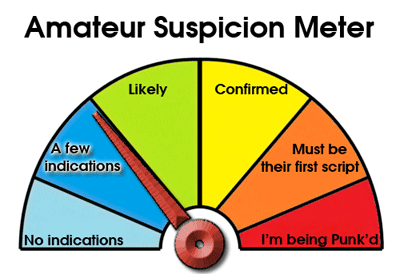
At this point we’ve seen some heavily armed pirates attack a container ship. Some decent action, but due to some formatting and stylistic choices, I already have a few indications that the writer is an amateur. Let’s see if that holds steady or changes on page 2…
Page 2
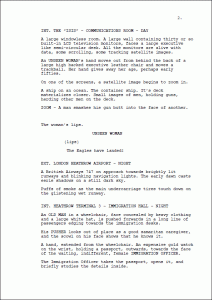 Page 2
Page 2
(Click image to open/enlarge in a new window)
THE GOOD
- A nice metaphor: “All the monitors are alive with data…”
- I like the evil Unseen Woman. Why don’t we get to see her full face? It’s interesting and sets up a mystery that my brain wants to solve. We’re also seeing a glimpse of the antagonist or co-antagonist, I assume.
- On the previous page, the action broke off abruptly. I like how we get to find out how the events play out, but from a different, unexpected vantage point.
- I’m not particularly fond of this sentence: “The early dawn casts eerie shadows on a still dark sky.” However, it certainly gives me a sense of the tone that the writer is going for.
- The page ends with me wanting to find out more about the two “out of place” individuals. [Note: At a recent gathering with my professional screenwriting friends, we all compared notes as to what our primary mandates were when writing a script. I said, “To make every scene entertaining or engaging in some way.” One of my friends said, “To end each page with a hook, so they want to see what happens on the next page.”]
THE QUESTIONABLE
- There’s an odd extra line space above the line: “The woman’s lips.”
- Jumping Jehosaphat! What’s up with the irregular dialogue formatting?! A big red flag just got raised. I mean, come on, this is version 10 of this script and there’s still such an obvious, basic formatting issue? In a 133 page script, where you should be desperate for places to trim your pages down, it’s simply unacceptable.
- Speaking of this dialogue block, why do we have both a parenthetical and a line description telling us to focus on this woman’s lips. In a script, redundancy = bad.
- While we’re on that parenthetical, why isn’t it offset from the dialogue margin?
- Paragraph 4: “It’s” — An incorrect homonym error. Should be “Its.”
- Second to last paragraph: “A hand, extended from the wheelchair.” I like the direction of the shot (to focus on the hand), but why can’t that be written in the active present tense? That is, “A hand extends from the wheelchair.”
- Same goes for the sentence that follows. “An expensive gold watch on the wrist, holding a passport, outwards, towards the face of the waiting, indifferent, female IMMIGRATION OFFICER.” It’s also a bit clumsy because the way it’s written, it seems that the gold watch is holding the passport.
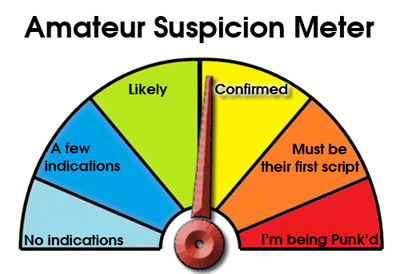
Whoa boy! We’ve shot past threat level 3 and have jumped to “Confirmed!” That dialogue formatting faux pas was huge. Remember, this isn’t the first draft of this script. This is version 10.3. (Have I mentioned before why it’s a terrible idea to put a version number on a spec script?)
There are also a bunch of “little” issues with this page, which I’m mentally combining with the “little” issues of the last pages. Collectively I can say with certainty that these “little” issues don’t happen with such frequency in professional scripts. Especially not in the first few pages which are vitally important for impressing your reader.
I know there are many people who don’t get all worked up about “little” formatting or stylistic problems in their writing. But if you don’t realize how important it is to avoid these issues, you have a steep uphill climb ahead of you if you want your work to be taken seriously, and get noticed (in the right way).
Remember, readers are looking for any reason to discount your script. Don’t hand them any! These types of issues are easy to fix. They just take some care, and learning.
Maybe things will turn around on the next few pages…
Page 3 – 11
While it’s easy to dismiss a script because of its many “amateur moves,” it’s also the job of the reader to determine whether the story has merit. Now that I’ve established a baseline technical skill level, I can relax about the “little” issues and focus more on the overall set up. So I’m going to critique pages 3 through 11 collectively.
Pages 3-6 and Pages 7-11
(Click images to open/enlarge in a new window)
THE GOOD
- A mysterious female character (there was only one key female character in The Usual Suspects, so if I’m right, I’m not sure how mysterious she is — but still, a cool device).
- An old man — is this Keyser Soze? His disguise at the airport (while it didn’t fool the person watching for him — if that was his intention) is an interesting scenario.
We were also introduced to the intriguing protagonist, who is whisked away in a helicopter to start his mission. He’s not the first choice for the mission, which gives him something to prove at the outset and makes us more likely to root for him.
The catalyst for the movie is quite clear — a nuclear bomb may have been loaded onto an airplane — whose pilot may be a Syrian terrorist! Meanwhile, there’s a mysterious ship that’s being pursued.
THE QUESTIONABLE
I don’t know any other way to say this — the writing was not of a professional caliber, and it’s hard to ignore. Everyone starts as an amateur, and this writer obviously has some good instincts, but a lot more care needs to be taken to elevate the material to the next level.
- Learning when to start and end a scene is a critical skill for screenwriters to learn. If you can, always try to end your scene on a “button.” For example, here’s an excerpt from the top of page 3.
IMMIGRATION OFFICER
Good morning Mr. Walker. Welcome to the United Kingdom. May I ask the purpose of your visit.
OLD MAN (O.C.)
I’m here to set the world on fire.
IMMIGRATION OFFICER
(laughing)
And what’s the real reason for your visit to the UK sir?
- In a recent article I talked about the importance of sentence variety in your scripts. On page 4, take a look at the last scene. 6 out of the 8 sentences start with “The.” Also on this page, the phrase, “Misty forest” is used twice in close proximity. And the word “misty” is used a third time after that on this page.
Summary
If you’re going to write a sequel (to a script you have no rights to), as a spec writing sample — your writing better knock the reader’s socks off. You already have one strike against you by even writing an unauthorized sequel (because it’s a common amateur move). So you had better wow the reader with your writing abilities.
There are a ton of rules that you have to learn to write scripts proficiently. And there’s almost always a correlation between the lack of these core writing skills that you see right away, and the bigger structural and plot issues that will manifest themselves later in the story.
At this point, I’ve seen enough problems to make me not want to spend my time reading the remainder of the script. However, if you’d like to read the latest version of the script in its entirety (we’re now at version 11.1), please do and let me know what you think.
In the meantime, I wish Blink well. He’s a good sport, and like I said, he’s got some good instincts. He just needs to keep writing and shore up his writing skills a little. I look forward to hearing about his developing projects and will personally be cheering him on.
Do you find this kind of critique helpful?

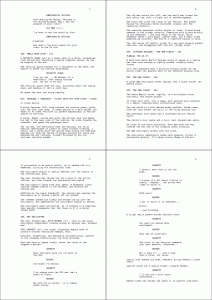
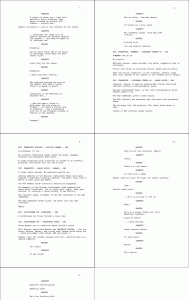




Yes, I found it helpful. And I got a laugh with the “I’m here to set the world on fire” and the “Immigration Officer” just laughs and says, “No, really sir…” Was this pre-9/11? That idiot would have been arrested on the spot if he did that today – detained and cavity-searched.
I could say a lot more, but you covered it well, Trevor. Well, indeed.
It will be great to hear from you, Blink. I’d say you got some good free coverage.
Have enjoyed reading your analysis and comments. Thanks for the link to the script. I’m interested to see where this one goes.
A picky thing – in your sentence above : “I don’t know any other way to say this — the writing was not of a professional caliber, and its hard to ignore.” , you should use “it’s” vs. “its”. One of my pet peeves. I just proofread a friend’s script and he used it incorrectly 3 dozen times. (Not his only mistakes, which made the script hard to read for content.) Anyway, carry on!
Hey Em,
Picky things are my middle name. Thanks for pointing that one out. It’s a big pet peeve of mine as well. I’ve updated the post. Quite ironic for me to make such a mistake in that particular sentence, I’d say! 🙂 At least you could tell from the remainder of my blog post that I do indeed know the difference.
3 dozen times — yeah, unfortunately that’s about the norm when I proofread scripts. Sad, but true. It’s quite jarring for those of us who grew up as sticklers for proper grammar and spelling… as many readers are.
Hey Scott, thanks! Glad you found it helpful.
Yes, if I were writing the script, I would have added a line above indicating that the old man says it with a wry smile or like he’s making a joke or something similar.